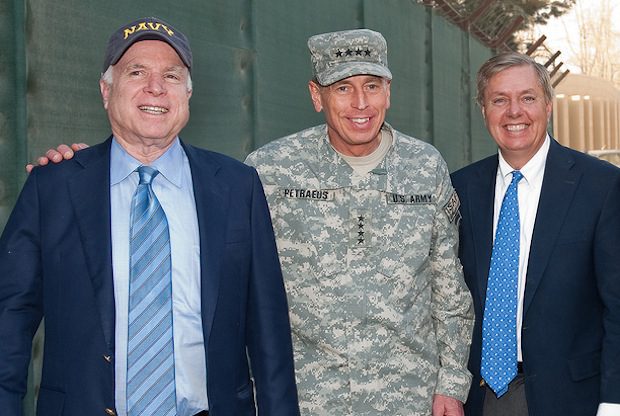The Hunt for Trump’s Secretary of State Continues

Giuliani reportedly remains the favorite for Secretary of State, but he might not get it:
CBS News’ Major Garrett reported Tuesday morning that Giuliani is still the likeliest pick — but that as Mr. Trump meets with Romney over dinner in Midtown Manhattan tonight, it’s hard to discount Romney as a top pick as well.
“I’m told that Giuliani is still the leading candidate but this dinner with Romney tonight … does add to the atmospheric drama around this whole process,” Garrett said on CBSN. The Trump team’s effort outreach to Romney began as just a reconciliation attempt, but “Trump has now taken it to another level, and until he firmly decides who his secretary of state is you can’t rule Romney out.”
It says a lot about the state of the Republican Party’s foreign policy that the top two contenders for the position at State have no relevant experience and seem to be deeply hostile to diplomatic engagement itself. Romney’s presidential campaign was defined to a large extent by his rejection of all efforts at engaging Russia, Iran, or any other rival or pariah government, and Giuliani has made no secret of his contempt for agreements produced by successful U.S. diplomacy. It would be very telling if Trump chooses a Secretary of State who holds most of the work that the State Department in such low regard, and by selecting either one he will be signaling that his foreign policy is likely to be very confrontational. Choosing Giuliani would be particularly bad news for Iran policy, as Ellen Laipson reminds us today:
Many—including the new national security adviser, Michael Flynn, and secretary of state contender Rudy Giuliani—have pre-existing strong views on Iran that go far beyond the debate over the nuclear agreement. They see Iran entirely in adversarial terms, and some have hinted at resurrecting “regime change” as an American strategic goal. That is something that U.S. presidents have walked away from for over 20 years, acknowledging that change in Iran will have to come from within.
Flynn has connected Iran, a majority-Shiite country, to all manner of current terrorist threats, despite the fact that al-Qaida and the so-called Islamic State are emphatically Sunni. While passionately decrying radical Islam as the main threat to the U.S., he has curiously singled out Iran as the country of greatest concern. Giuliani has associated himself with the Mujahedin-e Khalq, or MEK, the exiled Iranian leftist opposition group that has paid prominent Americans to speak at their annual rallies in Paris.
The third alternative that is being mentioned now is former Gen. David Petraeus. Unlike Giuliani and Romney, Petraeus is at least arguably qualified for the job from his time running Centcom, but his guilty plea for mishandling classified information ought to rule him out automatically. We should also remember that Petraeus has entertained the idea of recruiting “moderate” members from Jabhat al-Nusra in Syria, which at the very least demonstrates very poor judgment. Petraeus has long been an advocate for greater U.S. involvement in Syria, and was still talking about establishing a “no-fly zone” there as recently as last month. Escalation in Syria is the last thing the U.S. needs to be doing, and it becomes more likely if Petraeus is part of the administration. Especially if Trump brings in another retired general to run the Pentagon, putting Petraeus at State would also be at least one ex-general too many in a top national security position.
Comments